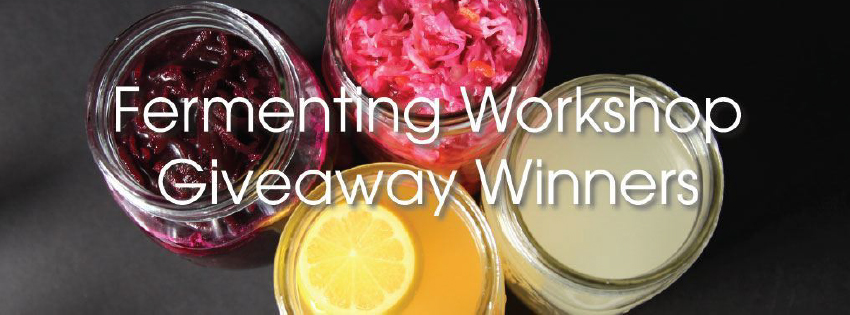
Our Fermenting Workshop winners announced!
Congratulations to Jo M. and Jessica D. who have each won a $60 pass to one of the upcoming Fermentation Workshops. Both have been contacted via email.
Thank you to everyone that entered our giveaway for the fermenting workshops.
While two lucky people managed to snag a complimentary place learning about fermentation, an opportunity for you to come along and learn about the wonders of making sauerkraut, kefir, nut cheese, tomato sauce and so much more is still here!
How can you benefit from Fermented Foods?
Here are some great reasons:
- It restores gut health: The lactic acid produced during fermentation promotes the growth of healthy flora in the intestine.
- It increases Vitamin A and Vitamin C levels: Lactic acid enhances a foods digestibility and increases vitamin C and vitamin A levels.
- Fermented foods are chock-full of probiotics or good bacteria. A myriad of research has demonstrated how the ideal balance of good and bad bacteria in your gut forms the foundation for physical, mental, and emotional well-being. See more at Fermented Foods: How to ‘Culture’ Your Way to Optimal Health
- Budget Friendly: Incorporating healthy foods into your diet can get expensive, but not so with fermented foods. You can make your own whey at home for a couple of dollars, and using that and sea salt, ferment many foods very inexpensively. See more at Health Benefits of Fermented Foods
- Traditional fermented foods can be beneficial for people with diabetes. In addition to improving pancreatic function, which is of great benefit to diabetics, the carbohydrates in lactic acid-fermented foods have been broken down or “pre-digested.” As a result, they do not place an extra burden on the pancreas, unlike ordinary carbohydrates. See more at Digestive Health Benefits of Traditional Fermented Foods
Live Fermentation Workshops
The Workshops take place on Sat 23rd and Sun 24th of May
You can learn a wonderful foundation to the science of lacto-fermentation, so you can ferment at home with confidence! As the perfect starting point when learning to ferment.
- The Lacto-fermented Vegetables Workshop will focus on the basics of making sauerkraut and kimchi.
- The Lacto-Fermented Condiments Workshop will teach you how fermented condiments are a healthy alternative to the processed, additive-laden varieties on supermarket shelves. It’s so simple to make your own!
- The Dairy & Non-Dairy Kefir Workshop will introduce you to the various methods and varieties of Kefir.
- Nut and Seed milks and cheeses are a wonderful alternative to dairy. Learn the benefits of soaking nuts and seeds and methods to make your own nut and seed milks.
You will discover techniques which can apply to all types of fermentation.
My first memories of tasting sauerkraut, the supermarket variety, as a teenager are uninspiring at best. I shudder recalling the taste.
What could possibly make me think it would be worth revisiting eating such a thing, let alone making my own fermented vegetables?
As it turns out, there are SO many reasons. Trillions of them on my body alone.
There is a term being flung around the worlds of nutrition, psychology, epigenetics, health, even environmental research. Microbiome.
What is Your Microbiome?
Why is it important enough to make me want to eat fermented cabbage?
There are literally trillions of microbes that live in and on our body. They include bacteria, fungi like yeasts, parasites and viruses. They outnumber our human cells 10 to one and their genes outnumber our genes one hundred fold.
Scientist are discovering that it’s in fact a beautiful symbiosis between our bodies and our microbes. We can’t exist without them and they need for us for survival.
Microbes perform functions like digest certain carbohydrates. This community of microbes regulate things like our digestive processes, our hormonal and immune systems and even our brains.
Microbiome issues could also be behind diabetes, obesity as well as certain cancers and mental disorders. The optimal balance of the numbers and types of microbes do matter and many bacteria keep us healthy by controlling the right human genes for healthy human functioning.
Consuming foods rich in healthy bacteria (pre- and probiotics) have the potential to heal and help us maintain a beneficial relationship with our microbes on a daily basis.
Still curious about the Human Microbiome? Check out this YouTube video for a bit of fun:
We’ll be talking more about the effects of fermentation on health in the weeks coming up to the classes.
Keep an eye out on our blog for recipes and easy ways to incorporate fermenting into your family’s diet!
Yours in Vital Health,
Dr Rosie Williams (Chiropractor)
